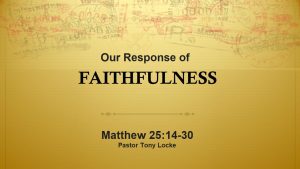Church Growth
The Church of the Living Dead — Sardis
Sermon Series in Revelation # 07 Revelation 3:1-6 1 “And to the angel of the church in Sardis write: ‘The words of him who has the seven spirits of God and the seven stars. “ ‘I know your works. You have the reputation of being alive, but you are dead. 2 Wake up, and strengthen what…
Read MoreFilling Up What Is Lacking in Christ’s Afflictions
Reverend Anthony R. Locke March 27th, 2011 www.FirstPresTucker.org at the First Presbyterian Church of Tucker Colossians 1:24-29 English Standard Version 24 Now I rejoice in my sufferings for your sake, and in my flesh I am filling up what is lacking in Christ’s afflictions for the sake of his body, that is, the church, 25 of which…
Read MoreFinding Our Place in Ministry
Reverend Anthony R. Locke September 26th, 2010 www.FirstPresTucker.org at the First Presbyterian Church of Tucker Acts 13:1-12 English Standard Version 1 Now there were in the church at Antioch prophets and teachers, Barnabas, Simeon who was called Niger, Lucius of Cyrene, Manaen a member of the court of Herod the tetrarch, and Saul. 2 While they were…
Read MoreWomen’s Ministry: Leading Us Into Family Life
Reverend Anthony R. Locke August 29th, 2010 www.FirstPresTucker.org at the First Presbyterian Church of Tucker Proverbs 31:10-31 Communion of Saints Series English Standard Version I haven’t listened to country music in a while, but I remember a funny song that had a line about going to the lost and found in a trailer park and asking if…
Read MoreDeacons: Leading Us Into Mercy
Reverend Anthony R. Locke August 22nd, 2010 www.FirstPresTucker.org at the First Presbyterian Church of Tucker . 1 Timothy 3:8-13 Elder / Deacon Series English Standard Version 8 Deacons likewise must be dignified, not double-tongued, not addicted to much wine, not greedy for dishonest gain. 9 They must hold the mystery of the faith with a clear conscience. 10 …
Read MoreElders: Leading Us Into the Light
Reverend Anthony R. Locke August 15th, 2010 www.FirstPresTucker.org at the First Presbyterian Church of Tucker. Titus 1:5-2:2 Apostle’s Creed Series 16 English Standard Version 5This is why I left you in Crete, so that you might put what remained into order, and appoint elders in every town as I directed you— 6 if anyone is above reproach,…
Read MoreOur Response of Faithfulness — Matthew 25:14-30
February 7th, 2010 Matthew 25:14-30 This passage is a illustration in one of Jesus’ sermons. I usually assume the story is real unless it is labeled a parable. This story seems to be made up by Jesus since it begins “It would be like . . .” Regardless, Jesus is going to drive home one big…
Read More





